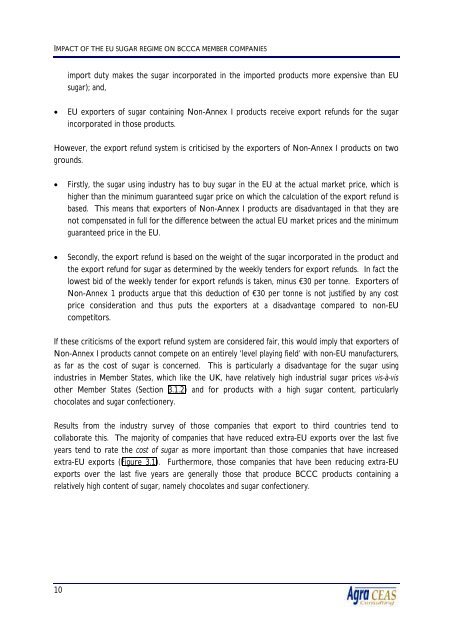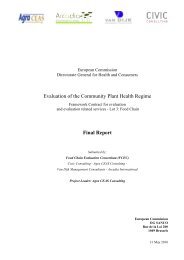2205 final report.pdf - Agra CEAS Consulting
2205 final report.pdf - Agra CEAS Consulting
2205 final report.pdf - Agra CEAS Consulting
Create successful ePaper yourself
Turn your PDF publications into a flip-book with our unique Google optimized e-Paper software.
IMPACT OF THE EU SUGAR REGIME ON BCCCA MEMBER COMPANIES<br />
import duty makes the sugar incorporated in the imported products more expensive than EU<br />
sugar); and,<br />
• EU exporters of sugar containing Non-Annex I products receive export refunds for the sugar<br />
incorporated in those products.<br />
However, the export refund system is criticised by the exporters of Non-Annex I products on two<br />
grounds.<br />
• Firstly, the sugar using industry has to buy sugar in the EU at the actual market price, which is<br />
higher than the minimum guaranteed sugar price on which the calculation of the export refund is<br />
based. This means that exporters of Non-Annex I products are disadvantaged in that they are<br />
not compensated in full for the difference between the actual EU market prices and the minimum<br />
guaranteed price in the EU.<br />
• Secondly, the export refund is based on the weight of the sugar incorporated in the product and<br />
the export refund for sugar as determined by the weekly tenders for export refunds. In fact the<br />
lowest bid of the weekly tender for export refunds is taken, minus €30 per tonne. Exporters of<br />
Non-Annex 1 products argue that this deduction of €30 per tonne is not justified by any cost<br />
price consideration and thus puts the exporters at a disadvantage compared to non-EU<br />
competitors.<br />
If these criticisms of the export refund system are considered fair, this would imply that exporters of<br />
Non-Annex I products cannot compete on an entirely ‘level playing field’ with non-EU manufacturers,<br />
as far as the cost of sugar is concerned. This is particularly a disadvantage for the sugar using<br />
industries in Member States, which like the UK, have relatively high industrial sugar prices vis-à-vis<br />
other Member States (Section 3.1.2) and for products with a high sugar content, particularly<br />
chocolates and sugar confectionery.<br />
Results from the industry survey of those companies that export to third countries tend to<br />
collaborate this. The majority of companies that have reduced extra-EU exports over the last five<br />
years tend to rate the cost of sugar as more important than those companies that have increased<br />
extra-EU exports (Figure 3.1). Furthermore, those companies that have been reducing extra-EU<br />
exports over the last five years are generally those that produce BCCC products containing a<br />
relatively high content of sugar, namely chocolates and sugar confectionery.<br />
10













